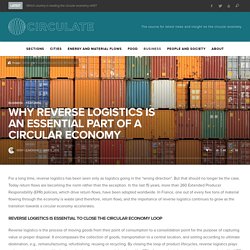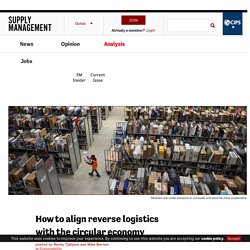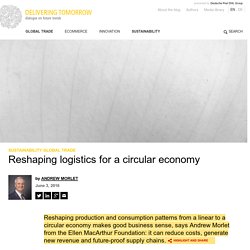

Researchgate. Why reverse logistics is an essential part of a circular economy. For a long time, reverse logistics has been seen only as logistics going in the “wrong direction”.

But that should no longer be the case. Today return flows are becoming the norm rather than the exception. In the last 15 years, more than 260 Extended Producer Responsibility (EPR) policies, which drive return flows, have been adopted worldwide. In France, one out of every five tons of material flowing through the economy is waste (and therefore, return flow), and the importance of reverse logistics continues to grow as the transition towards a circular economy accelerates. Reverse logistics is essential to close the circular economy loop. How to align reverse logistics with the circular economy - Supply Management. Retailers know they need to respond to calls for sustainability and be part of the Circular Economy (CE).

But integrating existing forms of reverse logistics and CE presents huge challenges for business managers. Past research has concentrated on how to avoid returns, or at least increase the recovery value of returned products. We spoke with 15 large UK retailers about their experiences and perspectives on joining up with CE principles: the clash between business interests and the ideals, the barriers to change and how they can be overcome. Reshaping logistics for a circular economy. Reshaping production and consumption patterns from a linear to a circular economy makes good business sense, says Andrew Morlet from the Ellen MacArthur Foundation: it can reduce costs, generate new revenue and future-proof supply chains.

Constantly refined since the dawn of the industrial revolution, the linear ‘take-make-dispose’ model has led to impressive economic development. But it is now facing an increasing number of challenges. Whether you consider supply risks, negative externalities or acute price volatility, we need to look beyond our current extractive model to capture new economic opportunities. Circular Economy and Logistics. Livingcircular.veolia. Logistics is challenging in a circular economy – VTT. Développement durable, supply chain management et stratégie : les cas de l’éco-conception: Logistique & Management: Vol 13, No 1.